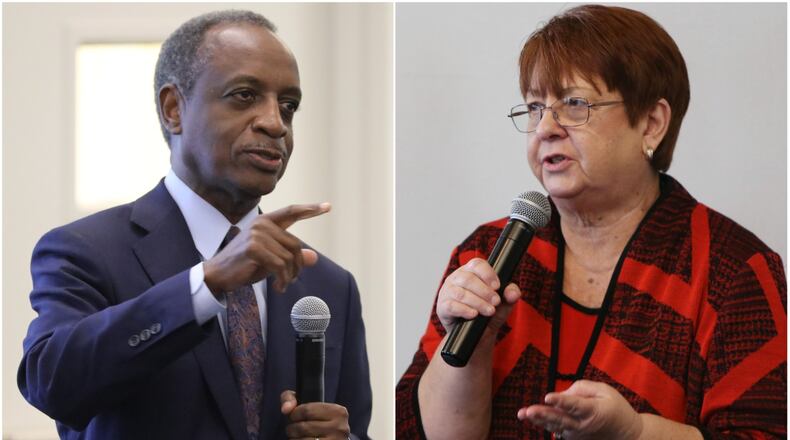Both DeKalb and Gwinnett counties issued new stay-at-home orders Friday, putting more stringent restrictions in place to try to limit the spread of coronavirus.
The timing wasn’t a coincidence. As it turns out, pandemics have a way of creating unlikely political alliances.
“We discussed our concern about what we were seeing in our own communities,” Gwinnett Commission Chairman Charlotte Nash, a Republican, said of her Friday phone call with DeKalb CEO Michael Thurmond, a Democrat. “We both were struggling with finding the right balance.”
The two orders aren’t identical, but they do help create consistency between the contiguous counties — especially important for the many residents who live in one county and work in another. Gwinnett and DeKalb have about 1.7 million residents between them and share a lengthy border.
Thurmond initiated the conversation before either county moved forward with Friday afternoon directives that order all residents to remain home except for certain “essential activities.”
“We wanted to demonstrate some unity of purpose, interjurisdictionally, across county lines,” Thurmond said. “So that we could communicate to our citizens that we’re in this together and we have to coordinate and work together.”
DeKalb's order says the counties will be "committed to sharing information so that executive orders, rules and regulations are regional and complimentary." Gwinnett's order has similar language, stressing the importance of working with neighboring jurisdictions — and specifically DeKalb — "to ensure, to the extent possible, a coordinated and efficient response" to the pandemic.
Historically speaking, DeKalb and Gwinnett counties haven’t exactly been political allies.
DeKalb has long been a bastion of Democratic power. Gwinnett is now trending blue, but its local leaders have for decades been Republicans.
That said, Thurmond and Nash have known each other for years and are both pragmatists as much as members of their respective parties.
“I despise the fact that there appears to be an effort to politicize it,” Nash said. “We’ve known each other a long time. It made perfectly good sense to have this discussion.”
Nash’s order was also coordinated with corresponding stay-at-home measures from each of Gwinnett County’s 16 cities, a feat in its own right. Ensuring each city was on the same page within the county has been a focus, Nash said — especially because many residents live in unincorporated Gwinnett County, but do not know that.
And while Thurmond’s order invited DeKalb cities to adopt the same measures, the execution was a little more scattershot.
By the time Thurmond issued his order on Friday, a handful of municipalities had already put their own stay-at-home orders in place. Several more DeKalb cities adopted new orders over the weekend.
The city of Lithonia recently adopted the more lenient restrictions DeKalb County put in place a week ago. And the city of Tucker appears to be holding out, thus far sticking with the curfew it put in place earlier this month.
“We are glad almost all of DeKalb is taking this seriously, and encouraged by more nearby jurisdictions taking strong action to save lives,” said Ted Terry, the former mayor of Clarkston and a DeKalb health board member. “Now is the time to extend these protections statewide.”
On the state level, Georgia Gov. Brian Kemp has closed bars and night clubs, ordered “medically fragile” residents to stay home and barred gatherings of more than 10 people unless proper physical distancing can be maintained.
But like Terry, many local government leaders have criticized Kemp’s approach and asked for more stringent measures to be put in place across the state, to limit confusion, provide more uniform guidance to residents and help limit the spread of the virus.
Thurmond didn’t directly answer a question about whether or not he’d prefer more sweeping action from the governor.
“This is the reality, this is the landscape,” Thurmond said. “So that just means that counties are going to have to communicate and coordinate and work closer together. It doesn’t matter what I wish or what I hope.”
Nash said she thought the governor had made the right choice in allowing leaders like Thurmond and herself to take the reins when it came to the coronavirus response. She said each jurisdiction is adjusting and tailoring orders to meet its own needs. And just as there are necessary differences between Gwinnett and DeKalb’s orders, there are different expectations for what might work around the state.
“I’m very comfortable with it,” she said. “We at the local level talk about local control, and it’s important.”
Keep Reading
The Latest
Featured



